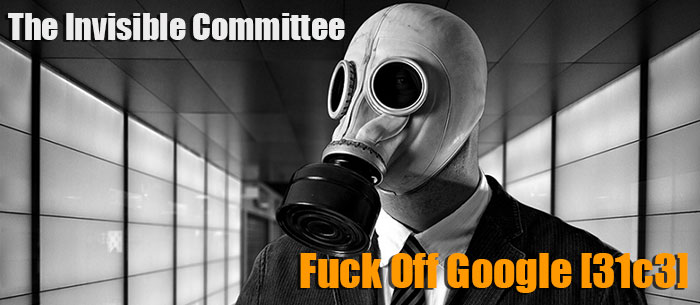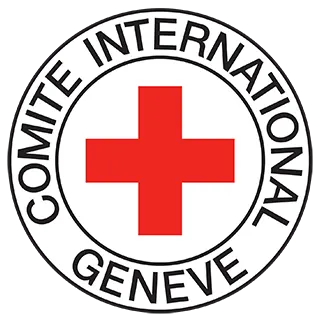
Home Anonymous Operations Anonymous Radio [CCC] The Invisible Committee
CCC-TV Radio Replay
4 January 2015 > français 00:00
The Invisible Committee Returns with "Fuck Off Google" [31c3]
31th Chaos Communication Congress of the Chaos Computer Club: Cybernetics, Anti-Terrorism, and the ongoing case against the Tarnac 10.
“There will be people who resist adopting and using technology, people who want nothing to do with virtual profiles, online data systems or smart phones. Yet a government might suspect that people who opt out completely have something to hide and thus are more likely to break laws, and as a counterterrorism measure, that government will build the kind of ‘hidden people’ registry we described earlier. If you don’t have any registered social-networking profiles or mobile subscriptions, and on-line references to you are unusually hard to find, you might be considered a candidate for such a registry. You might also be subjected to a strict set of new regulations that includes rigorous airport screening or even travel restrictions.”
The figure of the hacker contrasts point by point with the figure of the engineer, whatever the artistic, police-directed, or entrepreneurial efforts to neutralize him may be. Where the engineer would capture everything that functions in such a manner that everything functions better, in order to place it in the service of the system, the hacker asks himself “How does that work?” in order to find its flaws, but also to invent other uses, to experiment. Experimenting then means exploring what such and such a technique implies ethically. The hacker pulls techniques out of the technological system in order to free them. If we are slaves of technology, this is precisely because there is a whole ensemble of artifacts of our everyday existence that we take to be specifically “technical” and that we will always regard simply as black boxes of which we are the innocent users. The use of computers to attack the CIA attests rather clearly that cybernetics is no more the science of computers than astronomy is the science of telescopes. Understanding how any of the devices that surround us brings an immediate increase in power, giving us a purchase on what will then no longer appear as an environment, but as a world arranged in a certain way and one that we can shape. This is the hacker’s perspective on the world.
These past few years, the hacker milieu has gained some sophistication politically, managing to identify friends and enemies more clearly. Several substantial obstacles stand in the way of its becoming-revolutionary, however. In 1986, “Doctor Crash” wrote: “Whether you know it or not, if you are a hacker you are a revolutionary. Don’t worry, you’re on the right side.” It’s not certain that this sort of innocence is still possible. In the hacker milieu there‘s an originary illusion according to which “freedom of information,” “freedom of the Internet,” or “freedom of the individual” can be set against those who are bent on controlling them. This is a serious misunderstanding. Freedom and surveillance, freedom and the panoptical belong to the same paradigm of government.
Historically, the endless expansion of control procedures is the corollary of a form of power that is realized through the freedom of individuals. Liberal government is not one that is exercised directly on the bodies of its subjects or that expects a filial obedience from them. It’s a background power, which prefers to manage space and rule over interests rather than bodies. A power that oversees, monitors, and acts minimally, intervening only where the framework is threatened, against that which goes too far. Only free subjects, taken en masse, are governed. Individual freedom is not something that can be brandished against the government, for it is the very mechanism on which government depends, the one it regulates as closely as possible in order to obtain, from the amalgamation of all these freedoms, the anticipated mass effect. Ordo ab chao.
Government is that order which one obeys “like one eats when hungry and covers oneself when cold,” that servitude which I coproduce at the same time that I pursue my happiness, that I exercise my “freedom of expression.” “Market freedom requires an active and extremely vigilant politics,” explained one of the founders of neoliberalism. For the individual, monitored freedom is the only kind there is. This is what libertarians, in their infantilism, will never understand, and it’s this incomprehension that makes the libertarian idiocy attractive to some hackers. A genuinely free being is not even said to be free. It simply is, it exists, deploys its powers according to its being. We say of an animal that it is en liberté, “roaming free,” only when it lives in an environment that’s already completely controlled, fenced, civilized: in the park with human rules, where one indulges in a safari. “Friend” and “free” in English, and “Freund” and “frei” in German come from the same Indo-European root, which conveys the idea of a shared power that increases. Being free and having ties was one and the same thing. I am free because I have ties, because I am linked to a reality greater than me. In ancient Rome, the children of citizens were liberi : through them, it was Rome that was growing. Which goes to show how ridiculous and what a scam the individual freedom of “I do what I feel like doing” is. If they truly want to fight the government, the hackers have to give up this fetish. The cause of individual freedom is what prevents them from forming strong groups capable of laying down a real strategy, beyond a series of attacks; it’s also what explains their inability to form ties beyond themselves, their incapacity for becoming a historical force. A member of Telecomix alerts his colleagues in these terms: “What is certain is that the territory you’re living in is defended by persons you would do well to meet. Because they’re changing the world and they won’t wait for you.”
Another obstacle for the hacker movement, as every new meeting of the Chaos Computer Club demonstrates, is in managing to draw a front line in its own ranks between those working for a better government, or even the government, and those working for its destitution. The time has come for taking sides. It’s this basic question that eludes Julian Assange when he says: “We high-tech workers are a class and it’s time we recognize ourselves as such.” France has recently exploited the defect to the point of opening a university for molding “ethical hackers.” Under DCRI supervision, it will train people to fight against the real hackers, those who haven’t abandoned the hacker ethic.
These two problems merged in a case affecting us.
After so many attacks that so many of us applauded, Anonymous/LulzSec hackers found themselves, like Jeremy Hammond, nearly alone facing repression upon getting arrested. On Christmas day, 2011, LulzSec defaced the site of Strafor, a “private intelligence” multinational. By way of a homepage, there was now the scrolling text of The Coming Insurrection in English, and $700,000 was transferred from the accounts of Stratfor customers to a set of charitable associations – a Christmas present. And we weren’t able to do anything, either before or after their arrest. Of course, it’s safer to operate alone or in a small group – which obviously won’t protect you from infiltrators – when one goes after such targets, but it’s catastrophic for attacks that are so political, and so clearly within the purview of global action by our party, to be reduced by the police to some private crime, punishable by decades of prison or used as a handle for pressuring this or that “Internet pirate” to turn into a government agent.











